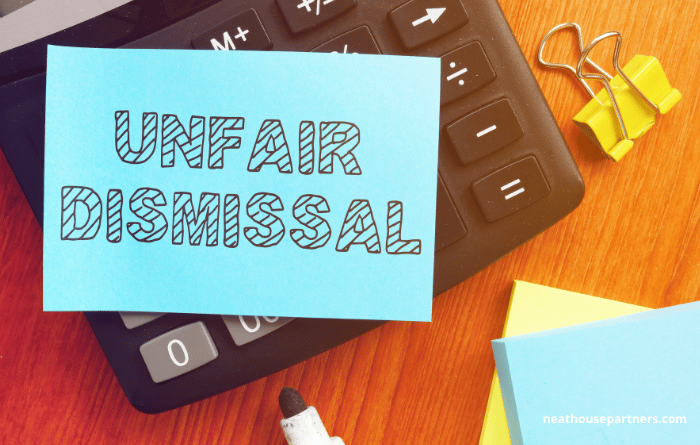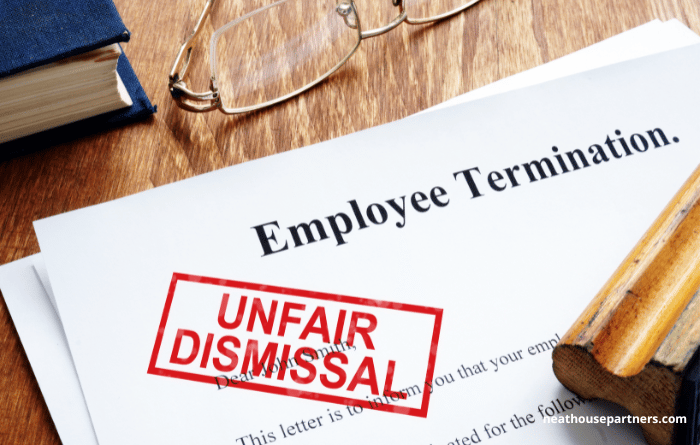Employees can bring unfair dismissal claims against employers if they believe their contract has been terminated without fair reason or when their employer does not follow the correct procedure during the dismissal process.
With nearly a quarter of a million unfair dismissal cases heard at employment tribunals in the last decade, it was the 3rd biggest employment complaint in that period, and the biggest tribunal complaint in the 2020/2 period with a total of 23,904 cases heard.
These figures highlight an uneasy employment market which could be a result of increased redundancies in light of the pandemic, lockdowns, restructuring, and job security concerns in a rapidly changing economic and working practices landscape.
As such, it’s fair to say that unfair dismissal claims are a topic that all employers should pay attention to and take steps to minimise their occurrence at their place of work. So what do employers need to do to mitigate the risk of unfair dismissal claims? We’ll cover what you need to know here.
What Is Unfair Dismissal?
Unfair dismissal occurs when an employer terminates an employee’s position without good or fair reason.
- It can affect employees who have a contract of employment or those who don’t.
- An unfair dismissal can also be a result of the organisation not following the correct disciplinary procedure when terminating a contract, such as not giving the employee a chance to improve their performance or not following correct redundancy procedures.
- It could also be because of discrimination against any protected characteristics such as race, religion or gender
- It could occur if an employee is dismissed when others weren’t despite being in the same situation
What Are The Grounds For Unfair Dismissal?
The Equality Act 2010 and the Employment Rights Act 1996 are laws that protect employees.
Within them, several grounds can be used to prove that a dismissal was unfair, including:
- If the dismissal was due to discriminatory reasons, such as the employee’s race, religion, or gender
- If the dismissal was due to the employee’s pregnancy or maternity leave
- If the employee was sacked in retaliation for whistle-blowing or raising health and safety concerns
- If the employee was treated unfairly compared to other employees who committed similar offences
- If the employee did not receive a fair disciplinary hearing before being dismissed
Fair Dismissal Grounds
Whilst letting employees go is never an easy task, employers can operate the process fairly under 5 legal reasons for dismissal, including:
- The employee is not capable of doing their job – for example, due to poor performance or a lot of sickness absence
- The employee has committed acts of misconduct – for example, taking drugs, using violence, engaging in criminal activity or gross misconduct.
- When there is a legal reason why you can’t keep an employee on. For example, they have lost the right to work in the UK or don’t have the required permits.
- When an employee’s role or position is redundant.
- “Some other substantial reason” is the term used to cover other situations that warrant dismissal but don’t fall within the above. This is often abbreviated to “SOSR”. An SOSR dismissal might cover a situation where two employees simply cannot work together due to a clash of personalities.
Your Responsibilities
The law states that employers must have a fair reason to dismiss an employee, and they must also follow a fair procedure. As a result, you have a responsibility to:
- have a fair reason to dismiss an employee, and they must also follow a fair procedure.
- ensure that the employees are performing their duties to the best of their ability. This includes providing adequate training, support and supervision.
- ensure that employees are aware of their rights and responsibilities surrounding the dismissal. For example, they should make sure that employees know how to raise concerns or make a complaint if they feel that they have been treated unfairly.
- provide information on the appeals process, and ensure that all employees are given a fair hearing.
- ensure that dismissals are carried out fairly and following the law. Failure to do so could result in costly tribunal claims.
- you must follow a full and proper procedure to ensure that the dismissal is fair and legal where an employee is not meeting the required standards and dismissal becomes necessary.
Correct Procedure To Follow
When dismissing an employee you must also be able to provide a clear justification for this decision and the process that was followed to reach it. A fair procedure will include:
- a valid reason for dismissal,
- giving the employee adequate notice of your intention to dismiss them
- holding a fair and unbiased hearing if appropriate, where the employee has an opportunity to defend themselves,
- allowing the employee the opportunity to appeal the decision
- any decision that is made regarding their employment must be communicated clearly to the employee.
- Ensuring that employees have access to information about your dismissals procedure
If you fail to cover these key steps, you may be liable for unfair dismissal.
Consequences Of Unfair Dismissal Claims
If an employee believes that they have been unfairly dismissed, they can bring a claim to an employment tribunal which can have costly consequences for you as an employer.
To succeed in their claim, the employee will need to show that their dismissal was not justified and that they have suffered financial loss as a result. The tribunal will consider all of the evidence and decide whether or not the dismissal was fair. If it is found not to be fair, you can be ordered to reinstate the employee in their previous role or alternative employment or pay them compensation.
If the case receives media attention your company’s reputation may suffer as a result, and the whole tribunal process can be a significant time and financial burden, especially if the employee is awarded a large sum of money. Finally, an employment tribunal can be disruptive to the workplace and damage employee morale which can have a knock-on effect on staff satisfaction and productivity.
As a result, employers need to ensure that they act fairly and reasonably when dismissing an employee.
Next Steps
If you are an employer and you are thinking about dismissing an employee, then you should seek professional advice to ensure that you are following the correct procedure. Whether you have an in-house HR team that needs support, or you fully outsource your human resources needs, you can talk to Neathouse Partners for help.
Our expert team will ensure that you have the knowledge and policies that you need in place to talk to your staff and protect you against the risk of unfair dismissal claims being brought against you when dealing with the difficult process of terminating employee contracts.







